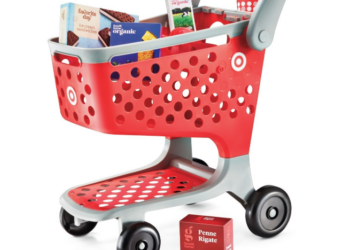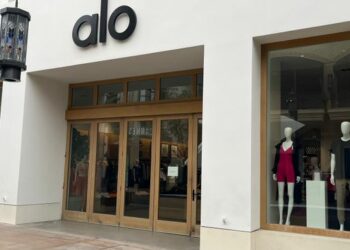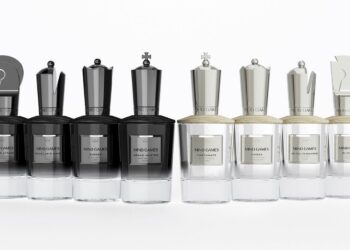It’s been another week with far more retail news than there is time in the day. Below, we break down some things you may have missed during the week and what we’re still thinking about.
From CVS’ line of branded healthcare products to Hostess Brands’ new caffeinated doughnut, here’s our closeout for the week.
What you may have missed
Fanatics acquires Mitchell & Ness with Jay-Z, others
Sports merchandise retailer Fanatics — along with Jay-Z, Maverick Carter, Meek Mill, Lil Baby and the D’Amelio family — has acquired lifestyle brand Mitchell & Ness from Juggernaut Capital Partners for an undisclosed amount. The strategic investment group, which is made up of “some of the most recognized names in sports, entertainment and culture” will own 25% of the company, according to an announcement emailed to Retail Dive.
Mitchell & Ness was founded in 1904 and has become known for authentic nostalgic jerseys, licensed products, street fashion and headwear. The brand has inked deals with the NBA, NFL, MLB, MLS and several NCAA schools.
Fanatics acquired Mitchell & Ness, known for its nostalgic jerseys.
Fanatics
The company will operate as a separate entity under the Fanatics Commerce division, according to the announcement. Fanatics plans to grow the company’s distribution network by adding Mitchell & Ness products to new retailers.
“Mitchell & Ness is an iconic brand and a pioneer within our industry. I’m incredibly excited for Fanatics to partner with this incredible group of innovative owners to build upon the company’s already strong business that has kept the brand culturally relevant for more than 100 years,” Fanatics CEO Michael Rubin said in a statement. “Growing up as a kid in Philadelphia we looked at Mitchell & Ness as a badge of pride, and I truly believe this legendary brand has no limit.”
The deal follows Fanatics’ acquisition of trading card company Topps earlier this year.
Brooks, Puma hit record highs
It was a big week for Brooks. The running brand topped $1 billion in annual revenue for the first time in its history, growing sales by 31% to $1.1 billion in 2021. Brooks was again the leading brand in the running specialty channel last year and also landed the top market share spot in adult running shoes in the athletic specialty and sporting goods channel, according to data from the NPD Group.
Around the same time, Brooks promoted its Chief Operating Officer Dan Sheridan to president of the company, in addition to his current role. Sheridan has been at Brooks for 24 years, and CEO Jim Weber touted his “leadership growth, capabilities, and track record for strategy and execution” as helpful assets to Brooks’ future growth.

Brooks hit $1 billion in revenue for the first time this year.
Courtesy of Brooks Running
Brooks isn’t the only athletics brand that reported strong results this week: Puma recorded the highest sales and EBIT in its history on Wednesday. Sales grew 32% in 2021 to 6.8 million euros ($7.6 million as of Thursday). Sales in footwear, apparel and accessories were all up more than 25% year over year, with footwear growing 36%.
“Compared to the pre-pandemic level in 2019, our sales even increased by 30%. Our continued brand momentum combined with high operational flexibility are the main reasons for these achievements,” CEO Bjørn Gulden said in a statement. “Our strategy of working closely together with our suppliers and retail partners to maneuver through all the short-term issues and obstacles without hindering our mid-term momentum paid off.”
The company has partnered with celebrities like Dua Lipa and has also established itself in niche markets its rivals aren’t in, GlobalData Apparel Analyst Louise Deglise-Favre said in emailed comments. “These marketing strategies will allow the brand to stay relevant in a post-pandemic world, where performance sportswear has regained importance as team sports and major events such as the Beijing Winter Olympics have resumed, but athleisure will remain crucial due to long-term casualization trends,” Deglise-Favre said.
CVS develops its own line of healthcare products
CVS Pharmacy on Tuesday announced the launch of six new private label healthcare products as an extension of its CVS Health line. Items include comfort grip canes, travel walkers, convertible shower chairs and 3-in-1 comfort commodes.
Most items are currently available on the company’s website and products will be available at over 6,000 store locations in March.
“There will be more than 70 million Americans ages 65 and older by 2030, along with millions of caregivers and other customers who need these types of products because of illness or while recuperating from an accident,” Brenda Lord, vice president of store brands, said in a statement. “By filling an unmet need for functional, but beautifully designed products, we aim to help improve the everyday lives of those who rely on these tools and who are seeking a more premium and customized market offering.”
Macellum keeps needling Kohl’s
Macellum Advisors, which owns 5% of Kohl’s, kept up its rhetorical confrontation with the Kohl’s board, knocking the retailer’s leaders for not engaging more deeply in a sale process. The financial firm said in a press release that “it appears the Board has still not authorized its bankers to aggressively canvass the market and initiate substantive conversations with a broader set of logical suitors.”
Earlier in the year Kohl’s acknowledged interest from potential financial buyers, one of them reported to be private equity firm Sycamore Partners. Kohl’s rejected the offers and adopted a poison pill to head off the possibility of a takeover, something else Macellum has taken issue with.
In January, Macellum called for a board shakeup and has announced its own selections for the company’s board. Along with a sale, the fund has suggested Kohl’s sell real estate, ramp up stock buybacks and consider breaking out its e-commerce business. Kohl’s said at the time it was “disappointed with the path” Macellum was pursuing. Kohl’s has said previously that it believes “Macellum’s effort to take control of the Board is unjustified and counterproductive.”
Retail Therapy
I donut know what to think about this
Hostess Brands recently announced the rollout of its caffeinated Hostess Boost Jumbo Donettes. That’s right, folks, these things are caffeinated and motivated and come in two different flavors — chocolate mocha and caramel macchiato.
“For adults who are increasingly looking for alternative sources of caffeine, our new Hostess Boost Jumbo Donettes offer a tasty, energy-boosting, grab-and-go way to jumpstart the day,” Christopher Balach, general manager of Hostess Brands, said in a statement.

Hostess Brands now lets you eat your morning coffee.
Hostess Brands
But, don’t get too jittery about the new product — each one is between 50 to 70 milligrams of caffeine, which is slightly less caffeine than one cup of joe. They are also three times bigger than the company’s mini donuts, are injected with coffee bean extract and are lightly glazed. Each single-serve pack is around $2.49 and can soon be found at convenience stores nationwide.
Because sometimes eating a donut and dunking it in a hot beverage is just too much work.
What we’re still thinking about
$2.50
That’s about how much a tall brewed coffee will cost you at Starbucks. But now shoppers can get their Starbucks delivered to their car while they’re grabbing their Drive Up orders at Target. The mass merchant announced the new functionality earlier this week, which it said was a top request from surveyed customers. Target will also accept returns through its drive up service.
15
That’s how many years Bath & Body Works CEO Andrew Meslow, who is stepping down in May this year for health reasons, has been with the company. Prior to serving as CEO, Meslow was Bath & Body Works’ chief operating officer. Analysts called his departure a “meaningful loss” for Bath & Body Works, but also called the retailer a “well-oiled machine” poised to continue growing.
What we’re watching
Allbirds to step into wholesale
Allbirds this week announced its plans to move into wholesale in the second quarter of this year. The DTC footwear brand will be selective in the retailers it forms partnerships with and co-CEO Joey Zwillinger on Wednesday described the strategy as “proactive and deliberate.”
The move to expand into wholesale follows that of many DTC brands in recent years as the limitations of selling solely direct to consumer become increasingly apparent. Coresight Research last year predicted brands to take a “hybrid wholesale-DTC” approach over the next three years. Partnerships between traditional retailers and DTC brands generally benefit both parties: Popular brands drive traffic, particularly from younger consumers, to legacy retailers, while retailers provide brands with an expanded distribution network both online and in stores.
Allbirds itself already operates 35 stores globally and has plans to add even more this year, but expanding into wholesale will help it grow its brand awareness, Zwillinger said.











